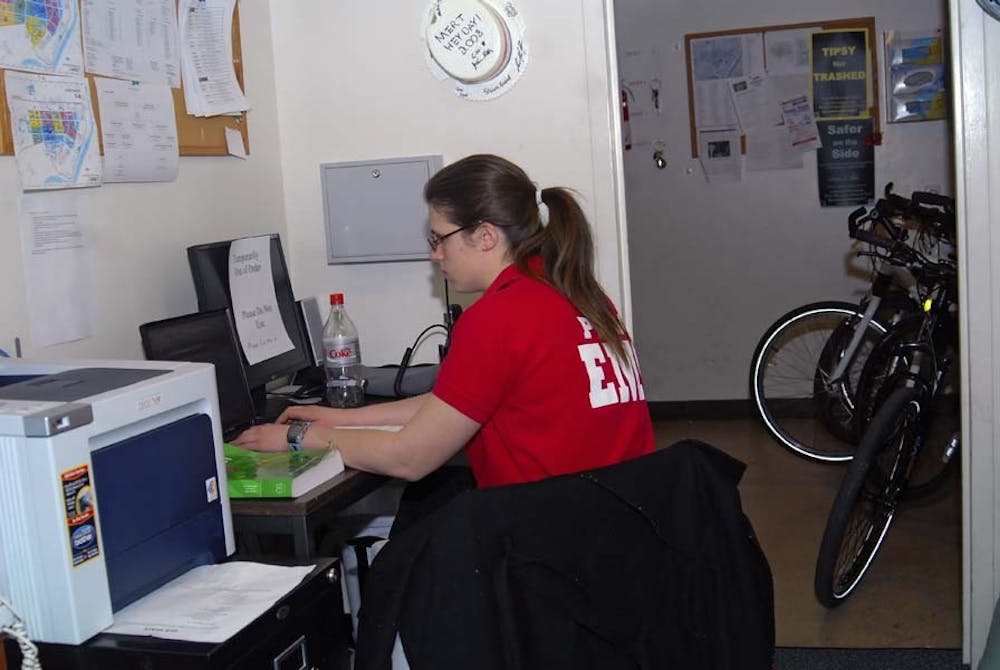
Remember when you threw up last Friday? So does the guy who responded to the 911 call, and he's in your math class.
Groups designed to have students help their peers provide valuable services, but also raise privacy concerns and may create uncomfortable situations.
The 49-member Medical Emergency Response Team - Penn's volunteer, student-run emergency-medical-service organization - responds to emergency calls from 7 p.m. to 7 a.m. seven days a week.
"For the past two semesters, half of our calls have been from drunk students, and the other half have been things like diabetic emergencies, sprained ankles, assaults or seizures," College junior and MERT chief Josh Glick said.
He said privacy is a major concern when treating students. Glick - who has been working for MERT for over two years - said treating students he does not know is one thing, but responding to friends' calls can be "awkward."
And "privacy is of the utmost importance when someone's dignity is compromised," Glick said, referencing reports of sexual assault and attempted suicide.
Situations like that "are very scary, and people are embarrassed about them," he said, adding that he sees some of the students who he has helped in compromising situations several times a week.
When a student calls Penn's emergency number, the Division of Public Safety contacts the MERT volunteers on duty, which means they are in uniform and within 30 seconds of their bicycles.
MERT volunteers write reports after each call, recording the name, address, situation and medical treatment provided.
The reports are necessary for legal reasons so MERT volunteers do not get charged with mishandling patients, Glick said. MERT officers also review the reports to check if the EMTs provided the correct medical service.
The records are "completely confidential," Glick said, adding that MERT volunteers are instructed not to talk to anyone about any of the specifics of a call.
Students manning the Reach-A-Peer Helpline can choose whether or not to tell people they're on the other end of the anonymous, confidential support line, which students can write letters to or call. Executive board members make their affiliation public, but others decide on their own.
"Some people chose to keep it confidential because they don't want to discourage anyone from calling," RAP Line President and College senior Katie Costello explained.
For privacy reasons, Costello could not release the number of staffers or say how many people call RAP Line, but said they get "enough calls to know it is definitely utilized."
RAP Line staff talks to students about issues they might have but doesn't give out advice. Instead, Costello said, RAP Line "helps students come up with their own solutions" and provides information about campus resources.
"People don't always feel comfortable talking to people they are close to, so it is nice to talk to someone who is somewhat removed but is still the same age and in the same environment," she added.
Student tutors also deal with potentially uncomfortable situations that can arise when helping their peers.
When Engineering senior Giann Gorospe started tutoring math his sophomore year, he said it was "a little awkward because I was tutoring people my year and slightly younger."
Tutoring is like "one-on-one recitation," according to Gorospe who does private sessions and works at satellite tutoring centers. There are 150 to 200 tutors involved in Penn's tutoring center and 1,700 to 2,000 student tutees, according to director Donna Brown. Tutors must be at least sophomores, have an overall GPA of at least 3.25 and at least an A- in the class he or she plans to tutor.
Although the center tries not a assign tutees to tutors they know, Gorospe privately tutored someone who is in his year and major, which "was a little awkward at first" because they saw each other a lot but eventually they "developed good dynamic."
Gorospe also now serves as a teaching assistant for a class that has some of his former tutees in it.
Still, Gorospe said he has never been a in a situation that has made him truly uncomfortable. The tutoring center has rules in place to prevent such situations, including a requirement that private sessions are held in public places.
The Daily Pennsylvanian is an independent, student-run newspaper. Please consider making a donation to support the coverage that shapes the University. Your generosity ensures a future of strong journalism at Penn.
DonatePlease note All comments are eligible for publication in The Daily Pennsylvanian.







